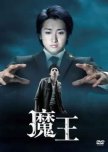Maou (2008) offers a compelling study in the mechanics of suspense and psychological complexity that many dramas only superficially attempt. On the surface, one might observe the intricate plotlines and the moral ambiguity that threads through each episode, but it is precisely the manner in which the series chooses to explore these elements that demands closer inspection.
The show invests considerable narrative energy into constructing characters that exist not merely as archetypes but as embodiments of conflicting motivations, a fact that requires viewers to engage beyond passive consumption. Satoshi Ohno’s portrayal of a figure oscillating between the shadows of vengeance and the fragile light of redemption is not simply a performance; it is a deliberate challenge to conventional heroism. Similarly, Toma Ikuta’s role serves less as foil and more as a mirror, reflecting the complexity and duality inherent in the drama’s moral universe.
One could easily praise the script’s refusal to succumb to tidy resolutions, embracing instead a cadence of tension and uncertainty that mirrors real human conflict. Yet, beneath this narrative ambition lies a broader commentary on justice and identity, questions that the drama raises without pretense, allowing the viewer to wrestle with them without didactic guidance.
Critics might point to the dense layering of symbolism and the deliberate pacing as barriers to immediate gratification, but to do so would miss the point entirely. The show’s insistence on depth over simplicity, on atmosphere over action, resists the typical transactional relationship between viewer and entertainment. Maou demands reflection, not mere distraction.
In this way, Maou transcends its genre, becoming not just a thriller, but an exploration of the psychological landscapes that define us. It is a work that neither panders nor placates, instead engaging the audience in a dialectic on the nature of good and evil, of power and vulnerability.
For those willing to embrace its challenge, Maou offers a rare and rewarding journey. It is a drama that refuses complacency, embodying a narrative rigor that few productions dare to attempt. To engage with Maou is to engage with storytelling at its most intellectually and emotionally resonant.
The show invests considerable narrative energy into constructing characters that exist not merely as archetypes but as embodiments of conflicting motivations, a fact that requires viewers to engage beyond passive consumption. Satoshi Ohno’s portrayal of a figure oscillating between the shadows of vengeance and the fragile light of redemption is not simply a performance; it is a deliberate challenge to conventional heroism. Similarly, Toma Ikuta’s role serves less as foil and more as a mirror, reflecting the complexity and duality inherent in the drama’s moral universe.
One could easily praise the script’s refusal to succumb to tidy resolutions, embracing instead a cadence of tension and uncertainty that mirrors real human conflict. Yet, beneath this narrative ambition lies a broader commentary on justice and identity, questions that the drama raises without pretense, allowing the viewer to wrestle with them without didactic guidance.
Critics might point to the dense layering of symbolism and the deliberate pacing as barriers to immediate gratification, but to do so would miss the point entirely. The show’s insistence on depth over simplicity, on atmosphere over action, resists the typical transactional relationship between viewer and entertainment. Maou demands reflection, not mere distraction.
In this way, Maou transcends its genre, becoming not just a thriller, but an exploration of the psychological landscapes that define us. It is a work that neither panders nor placates, instead engaging the audience in a dialectic on the nature of good and evil, of power and vulnerability.
For those willing to embrace its challenge, Maou offers a rare and rewarding journey. It is a drama that refuses complacency, embodying a narrative rigor that few productions dare to attempt. To engage with Maou is to engage with storytelling at its most intellectually and emotionally resonant.
Was this review helpful to you?




